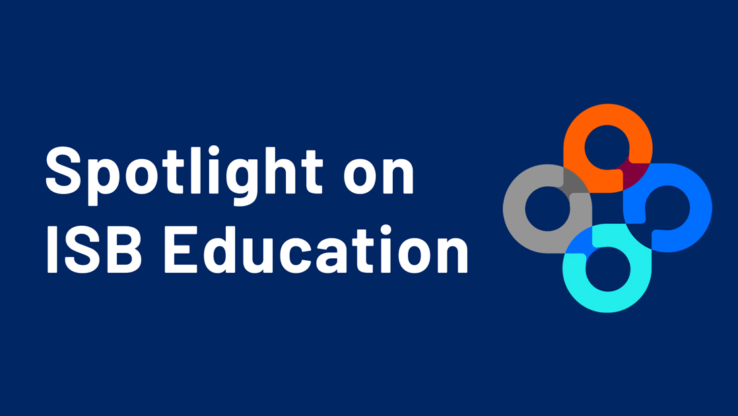2022-23 School Year ISB Education Highlights
 isbscience.org/news/2023/08/01/2022-23-school-year-isb-education-highlights/
isbscience.org/news/2023/08/01/2022-23-school-year-isb-education-highlights/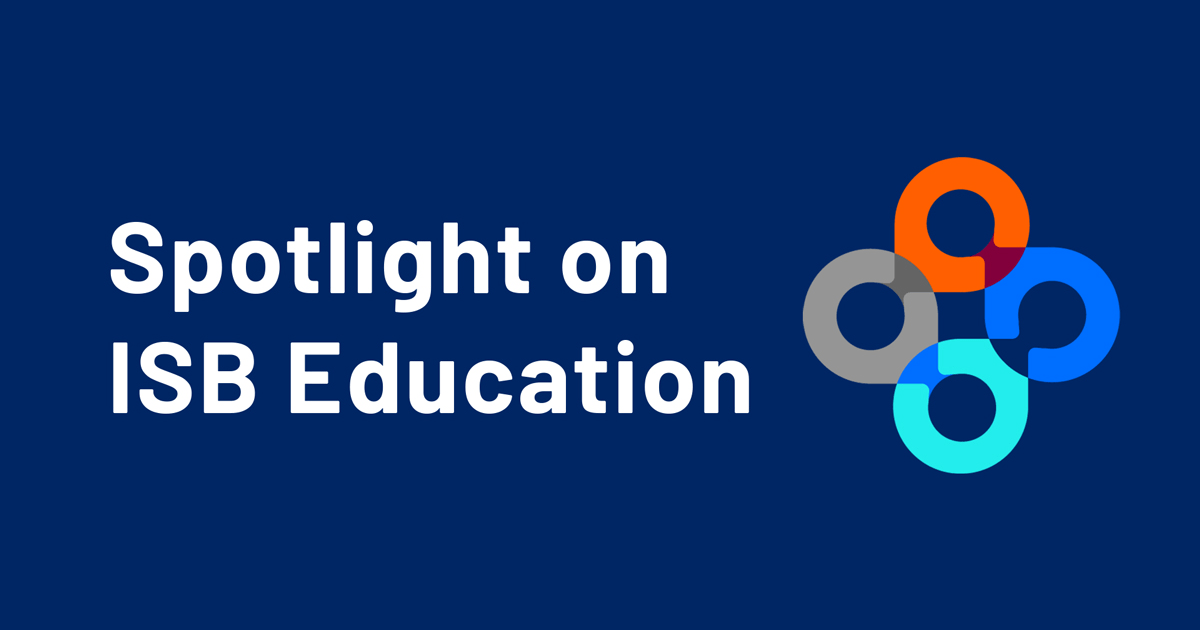
Each month throughout the 2022-2023 academic year, we will highlight some of the top projects the team is working on.
Summer highlights
June through September
Big numbers, high energy, impressive products!
The student-teacher-scientist partnerships were in high gear this summer. These education projects are supported by ISB research federal grants for broader impacts to society.
More than 150 high school students participated in ISB programs:
- Ninety-nine ambassadors took two-hour courses and extended learning into a variety of projects featured here. Their journey started by learning about systems and systems modeling and then applying their learning across three different microcourses:
- 29 students – Environmental Systems, Research & Stewardship
- 37 students – Introduction to Systems Medicine
- 51 students – Learning in Motion: Taking Action in Your Community
- Twelve Environmental Systems in the Outdoor Research Experience (ESORE) interns joined environmental scientists and educators at local field sites across six weeks to contribute to environmental research projects.
- Nine research interns worked at ISB over more than seven weeks and documented their experience here.
- Thirty-nine high school students received credit to take ISB courses at Lake Washington Institute of Technology through WA Network for Innovative Careers.
- Seventeen took Systems Thinking for Health & Wellness.
- Twenty-two took Biosystems and Genetics Research and Bioethics.
Seventeen undergraduates from schools across the country worked with 25 ISB scientists and staff to develop their research skills and grow their professional networks.
Ten teachers, four college/master’s students, 12+ high school students and 17+ scientists co-developed engaging, authentic science experiences for classrooms on cancer, systems medicine, machine learning, microplastics in the Arctic, evolution, adaptation and resilience.
Eleven community college faculty from Washington state worked with three scientists to build activities to support college students learning about big data in biology as part of Next-Gen Bio Learning Network.
Two Americorps members were actively involved in the above programs by leading research experiences, mentoring students through independent ambassador projects and assisting in the classroom.
May highlights
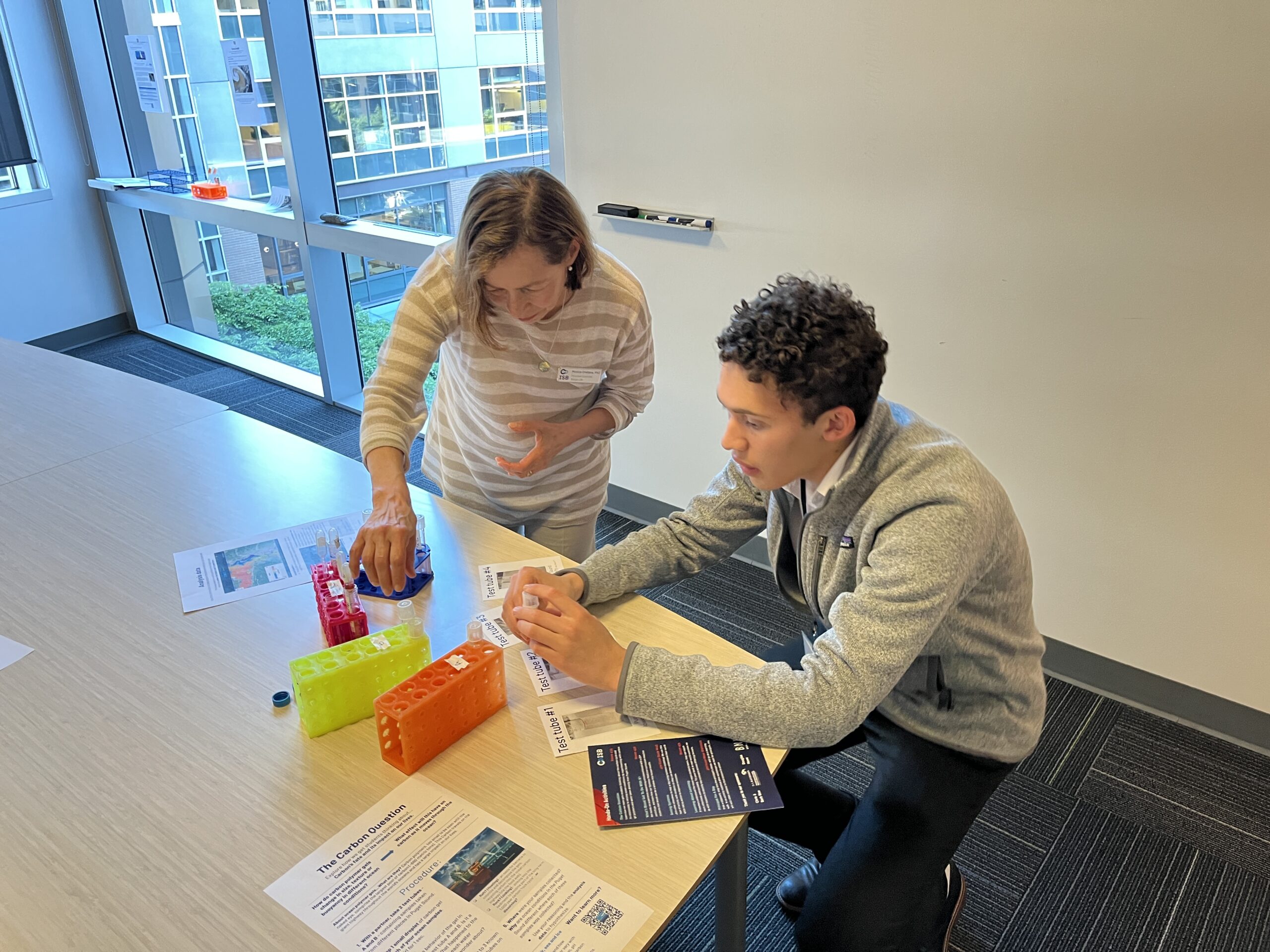
During Ignite STEM, ISB Education hosted several stations offering brief, interactive experiences of how the team works with students, teachers and school administrators to foster next-generation science learning.
Ignite STEM: A Celebration Supporting ISB Education
On May 11, ISB hosted a fun and engaging fundraising event, and it was wonderful to welcome our valued supporters in-person at ISB! The Education team extends a big thank you to all who came to this evening.
- Guests had fun exploring our education programs at hands-on stations.
- Dr. Jim Heath was the emcee, and we celebrated Cheryl Lydon as the 10th recipient of the Valerie Logan Leadership in Science Education Award.
- Dr. Lee Hood presented his thoughts on “Health, Happiness, and Creativity”
- Six student volunteers shared their stories of ISB’s impact, including Anjana Punniamoorthy, David Brady, Kally Chamberlain, Mohuwa Wahid, Monica Ballas, and Sarah Feng.
ISB Retreat
On May 3 and 4, the ISB Education team joined all of ISB for a retreat in Leavenworth, Wash.
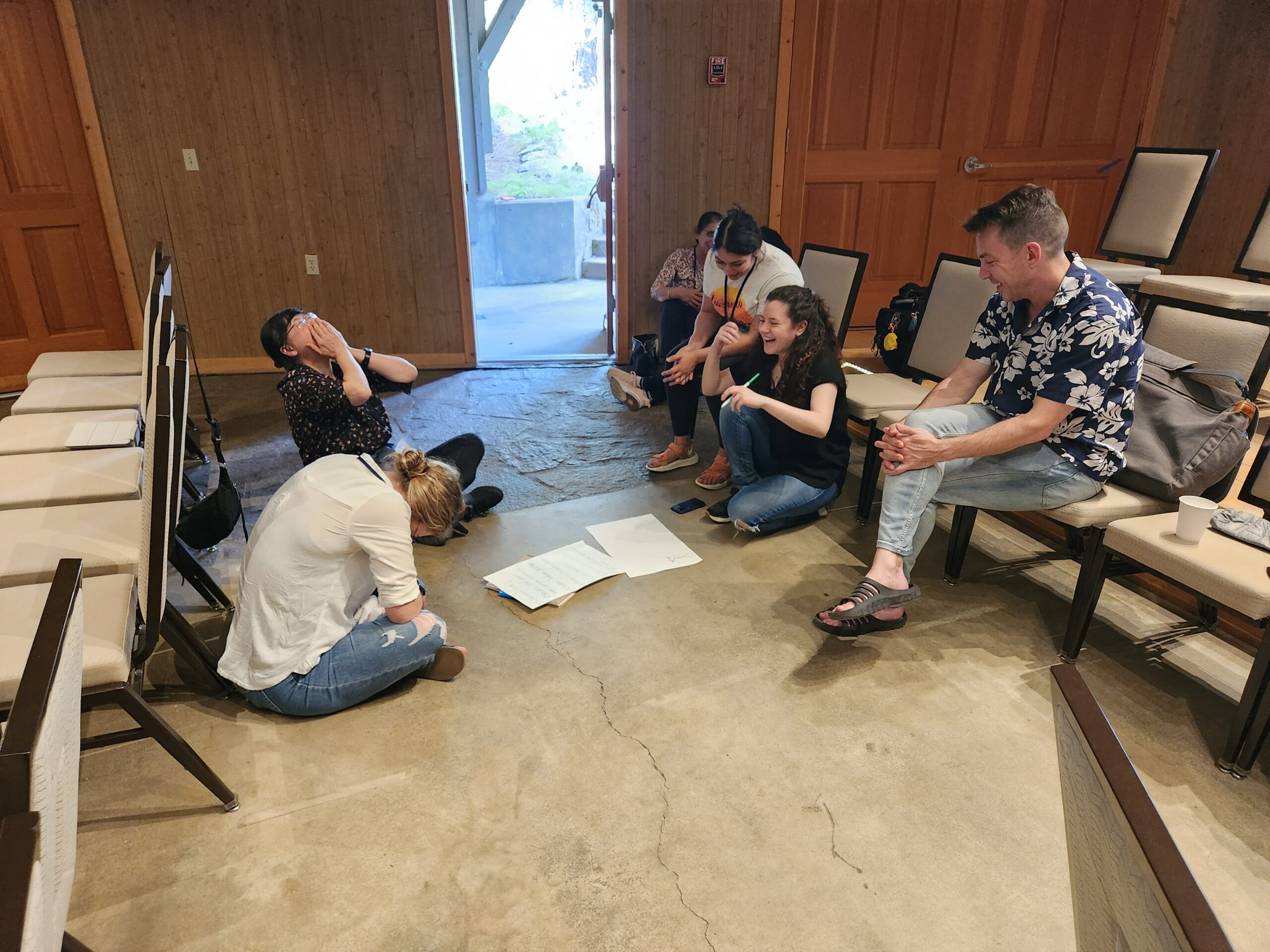
Members of ISB participate in an exercise at ISB’s retreat held in early May in Leavenworth, Wash.
We learned and contributed to ISB’s ongoing work in multiple fields and had opportunities to share our work through three poster presentations, one panel discussion and an all-ISB session. One of the highlights was ISB Education’s Claudia Ludwig leading all of ISB through a thinking exercise to develop lists of our rules of life.
Innovator Projects
The 2022-2023 Innovator Award final presentations occurred on May 23, with two education-related projects officially concluding their year of funding.
- “Advancing the Next Generation of Leaders in Science” continues their work through an in-progress paper for the Journal of STEM Outreach, resources to pursue future funding, and an upcoming third cohort of the LEADS program in summer 2023.
- “Demystifying Machine Learning for the High School Classroom” collaboratively created and optimized new curricular resources which were field tested in five different contexts. This work continues this summer by adding new data sets in prep for broad dissemination.
April highlights
ISB Education is in the midst of four great professional development workshop series for Washington educators:
Crosscutting Concepts Woven through Core Science Units
A STEM workshop for secondary Science/STEM/CTE teachers. This four-part workshop engages teachers to expand their knowledge about the big ideas of science: the cross-cutting concepts. Teachers learn by engaging in lessons from a student perspective and from the perspectives of STEM Professionals.
Systems are Everywhere!
A STEM Workshop for elementary, middle, and high school teachers. This workshop aids K-12 teachers in weaving systems thinking into any core science unit.
3D NGSS High School Science Academy
This three-month series guides regional high school science teachers to incorporate best practices, called science-routines, into any core science course: biology, chemistry, physics.
Principles of Science for Principals
This six-part series for school and district leaders is focused on developing leadership actions for increasing science in elementary schools. Principals from six school districts are learning about best practices that first anchor learning experiences in science, then integrate the skill development for reading, writing, math, and social studies.
March highlights
ISB Education hit the national stage this month at the 2023 National Science Teaching Association conference in Atlanta
-
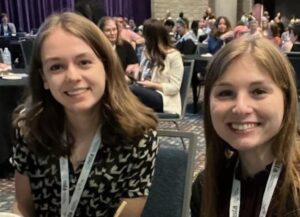
AmeriCorps members Miranda Johnson, left, and Sara Calder.
AmeriCorps members Miranda Johnson and Sara Calder, pictured at right, presented a hands-on workshop titled “Powering Student Success in STEM with Systems Thinking and Career Connected Learning.” This workshop featured our Systems Thinkers in STEM resources and the Systems are Everywhere curriculum module. In addition to presenting, our AmeriCorps members also attended a combined 44 sessions throughout the conference, reconnected with previous ISBers, made new contacts, and strengthened existing relationships!
- Caroline Kiehle, as director of the Puget Sound LASER Alliance, funded two district science leaders to attend NSTA. These two reps, from Tacoma and Franklin-Pierce school districts, will present new resources and inspiration to the Alliance’s regional workshop in April.
ISB Education is excited that our work with students continues
- We wrapped up one school year internship with seven students from Raisbeck Aviation High School and for the second year in a row partnered with Highline School District for their VOICES internship.
- We are reviewing 418 undergrad and 344 high school applications to select students to participate in our Summer 2023 programs.
ISB Education’s statewide teacher-support projects with ClimeTime continue to expand
- Classroom resources are launched! ISB’s Open Educational Resources (OER) resources are now available to teachers on National and WA State OER Commons.
- High school science teachers are learning best practices. Our second cohort for the High School Science Teacher Academy just wrapped up and we are recruiting a third group for April-June.
- Elementary and secondary teachers are enrolling now for the spring series of workshops.
- Claudia Ludwig participated in the spring convening of grantees held in Anacortes, Wash., to strategize on current work and to plan the year ahead.
- Learn more about ClimeTime here and ISB’s ClimeTime project here.
February highlights
‘Elementary Science Needs a Comeback!’
ISB Education was pleased to co-present a workshop with Washington State LASER (Leadership Assistance for Science Education Reform), in collaboration with state and regional leaders in STEM education. Science has all but disappeared in many elementary schools during the pandemic. This workshop met a need across all the LASER regions – to support science learning experiences for students in Washington state. More than 80 district and school leaders participated in the half-day workshop. Case stories were presented to highlight how elementary science is being integrated into the school day – cases included one school’s story, a whole-district approach, and a district-collaborative’s strategy. The presenters shared their most useful resources, then participants had small-group time to network with regional colleagues about action steps to take.
Leadership, Empowerment and Development in STEM (LEADS)
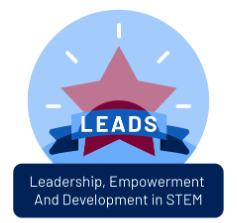 ISB Education celebrates the team of 18 scientists and educators, nine high school volunteers, and six professional partners who collaboratively developed and launched LEADS with 41 students from 25 different high schools in 16 different school districts across five states. This program helps support and prepare high school students, especially students from communities who have been historically marginalized, to be STEM leaders. LEADS focuses on the development of seven major competencies identified as foundational for STEM leaders:
ISB Education celebrates the team of 18 scientists and educators, nine high school volunteers, and six professional partners who collaboratively developed and launched LEADS with 41 students from 25 different high schools in 16 different school districts across five states. This program helps support and prepare high school students, especially students from communities who have been historically marginalized, to be STEM leaders. LEADS focuses on the development of seven major competencies identified as foundational for STEM leaders:
- Has the ability to use persuasive internal dialogue to recognize, plan and act
- Has the ability to use persuasive communication interpersonally
- Has the ability to negotiate and resolve conflict
- Is a self directed learner
- Understands the power of personality style
- Utilizes and leverages group dynamics in order to maximize outcomes
- Exercises sound judgment
The LEADS team wrapped up their second hybrid cohort on Saturday, February 11 with the first0ever in-person session! Fifteen students, all identifying with a community historically marginalized in STEM, came to ISB for a full day of leadership activities, intentional discussion, and to hear from a speaker on how she developed her leadership skills throughout her career path. The team is excited to continue the program with a new cohort this summer.
January highlights
ISB is recruiting undergraduate and high school interns and ambassadors
During this upcoming summer and the 2023-2024 academic year, ISB will host students in person and virtually through a variety of programs. See the following pages for more information
- For undergraduate positions: Summer Undergraduate Research Program
- For high school positions: Systems Education Experiences high school intern program and ISB Careers.
ISB Education hosted Jim Heath to give ‘A Scientist’s View of the NGSS Crosscutting Concepts’ to 20 science/STEM leaders
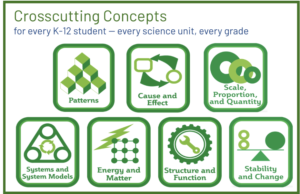 On January 19, ISB President Dr. Jim Heath presented to our network of Science/STEM leaders for about 20 school districts in this region, called Puget Sound LASER Alliance.
On January 19, ISB President Dr. Jim Heath presented to our network of Science/STEM leaders for about 20 school districts in this region, called Puget Sound LASER Alliance.
The Next Generation Science Standards for grades K-12 have a focus on seven big ideas of science, called the Crosscutting Concepts. The innovation for this workshop was to come up with ways of connecting these big ideas of science with the new state standards for social studies.
ISB Education is excited to share some newly developed resources
As part of an ongoing project called Next-Gen Bio Learning Network, ISB educators and scientists worked with community college educators to create a small suite of resources that support student awareness and learning of quantitative biology skills. The resources include an assessment, a journal club template and Google Colab, and are all ready for use in both virtual and/or in-person classrooms.The resources are available as part of the QUBESHub website.
November and December highlights
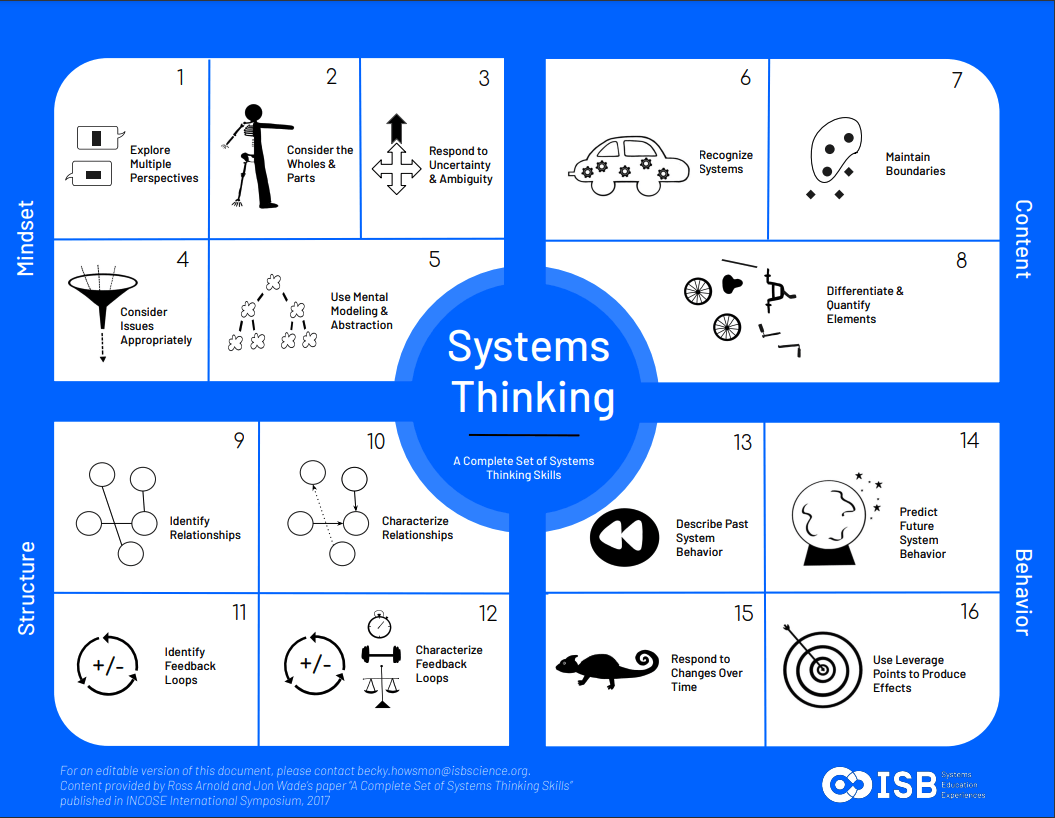
ISB Education communicated our work and impacts to ISB’s Board of Directors.
Caroline Kiehle and Claudia Ludwig engaged the Board of Directors with the “Systems Thinking Skills” (see graphic) to give them a firsthand experience of how we work with students, teachers, school leaders and partners. We later presented the education portion of ISB’s Strategic Plan to the Board’s Strategy Committee, displaying ISB Education’s primary goal, our four strategies, and a set of key performance indicators with current data and annual targets.
ISB Education enjoys providing internships for nine high school student interns during the current school year.
- One student is from Ingraham High School in Seattle.
- One student is from Interlake High School in Bellevue.
- Seven students are from Raisbeck Aviation High School in Tukwila.
ISB Education welcomed nine students from Tacoma Community College (TCC).
The TCC students interviewed ISB Senior Research Scientist Dr. Christian Diener about a paper he authored based on his research funded by the ISB Innovator Award Program.
- The students worked withTCC Professor Kim Harrington, co-PI of ISB’s Next-Gen Bio Learning Network, to develop descriptions of the figures in the paper and questions for Dr. Diener.
- ISB recorded the conversation between the students and Diener to share with future students.
- Several of the students expressed interest in returning to ISB as participants in the Summer Undergraduate Research Program
- TCC’s MESA Program Director Adrienne Scarcella joined the group, and said: “I had a blast and really appreciated what y’all are doing and the climate there. I am a huge fan now! Just seeing y’all set-up demonstrated y’all’s values.”
ISB Education co-presented an all-day workshop at the STEM Summit held at Microsoft. LASER Alliances (nine regional teams of school district STEM leaders) collaborated on two problems of practice:
- Implications of current data reported by 296 school districts on the status of their K-5 science programs, and
- Design of the next two statewide workshops for STEM education leaders.
Learn more about LASER here.
ISB Education joined leaders in Spokane to strategize climate science learning that reaches all Washington state students.
- This was part of ClimeTime, a Washington state legislative proviso originally requested by Governor Jay Inslee. Learn more about that effort on the ClimeTime website.
- ISB’s partners in this effort include: OSPI, UW Math and Science Institute, Chief Leschi Schools, EarthGen, Gonzaga Center for Climate, Society, and the Environment, Islandwood, Padilla Bay, PEI, Teaching for the Climate Collaborative, and all nine Washington State Educational Service Districts.
October highlights
ISB Education welcomed a second AmeriCorps Member
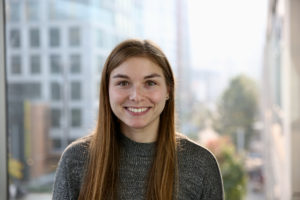
Sara Calder
Sara Calder (AmeriCorps/Washington Service Corps) began October 17 and will be working with high school and undergraduate students through our Systems Thinkers in STEM and Systems Medicine programs. Learn more about Calder by reading this Q&A about Sara and her AmeriCorps service project.
ISB Education was proud to present at WSTA
The Washington Science Teachers Association conference took place October 14 and 15 in Wenatchee, Wash. Dr. Jen Eklund shared our work helping educators to learn more about systems and systems thinking skills.
Scientist-educators from the Gibbons Lab lead Microbiome Course and Symposium Courses like these play an important role in providing continuing education for new and experienced scientists. See recordings of the sessions on ISB’s YouTube channel or explore more on the course website.
ISB Education launched the school year for state science/STEM leaders
- “How STEM can support social emotional learning and racial equity”
- Fall/Winter/Spring webinar series hosted by Washington LASER
- Case stories of solutions to this challenge were shared by some of our partners:
- Dr. Keisha Scarlett, Seattle Public Schools
- Lana Huizar, Bellevue School District
- Chad Mullen and Vickei Hrdina, LASER_SW & CareerConnect SW
- Shannon Heckelsmiller, Tahoma School District
- Doug Dowell, Central Kitsap School District
September highlights
ISB Education reconnected with the community college faculty who learned with us Summer 2021 to hear more about their classroom implementation as part of the Research Coordination Network Incubator Project: Networking Systems Biologists with Community College Educators.
As part of this project, community college students across the region had opportunities to work with contemporary data sets. Here’s what participants are saying:
Participating faculty member: “I think that one of the things that makes collaborating with active researchers and other faculty who are interested in the work [so successful] is the immediacy of the information that we are working with. It’s great to be able to teach current research, rather than things that have been languishing in textbooks for a century.”
Participating faculty member: “A fairly large portion of my students are from underrepresented communities and many are the first in their families to attend college or aspire to a Bachelor’s degree. I have been doing a sequencing project with them in the lab and the real world applications of their work excites many of them. I am excited to have them work on a project that is a part of ongoing research and help them really identify as scientists for the first time.”
Participating student: “The [paper] that we studied taught me so much about different types of statistical representations used in science journals. I started out not understanding any of it and now I can look at similar charts and data and understand what’s going on.”
The ISB Education team is looking forward to continuing this important work with community college faculty with a 5-year National Science Foundation Research Coordination Project: Networking Next-Gen Biologists with Community College Educators.
The project will fund community college faculty and early-career researchers from non-degree granting institutions to collaborate around building classroom resources that incorporate big data.
- Dr. Jen Eklund will lead this work with support from Claudia Ludwig, Dr. Jake Valenzuela, Dr. Sean Gibbons, Dr. Irene Shaver from the Washington State Board of Community and Technical Colleges, Kim Harrington from Tacoma Community College, and Kristen Joachimides from North Seattle College.
- The project will recruit scientists from a variety of institutions including ISB, Fred Hutch, Allen Institute, and the Pacific Northwest National Laboratory and community college faculty from across Washington state.
ISB Education co-hosted the LASER Fall Workshop for educators across Washington, titled “How STEM Can Support Social Emotional Learning and Racial Equity.”
ISB Education is a partner in Washington State LASER, a science/STEM network of leaders. Learn more here. The winter and spring workshops will address other key topics for this school year: “Elementary Science Needs a Comeback!” and “Toolbox for Building Equitable Science Programs.”
Summer highlights (July through August)
ISB Education had a fun and productive time with 21 Undergraduate and 12 High School Research Interns at ISB this summer.
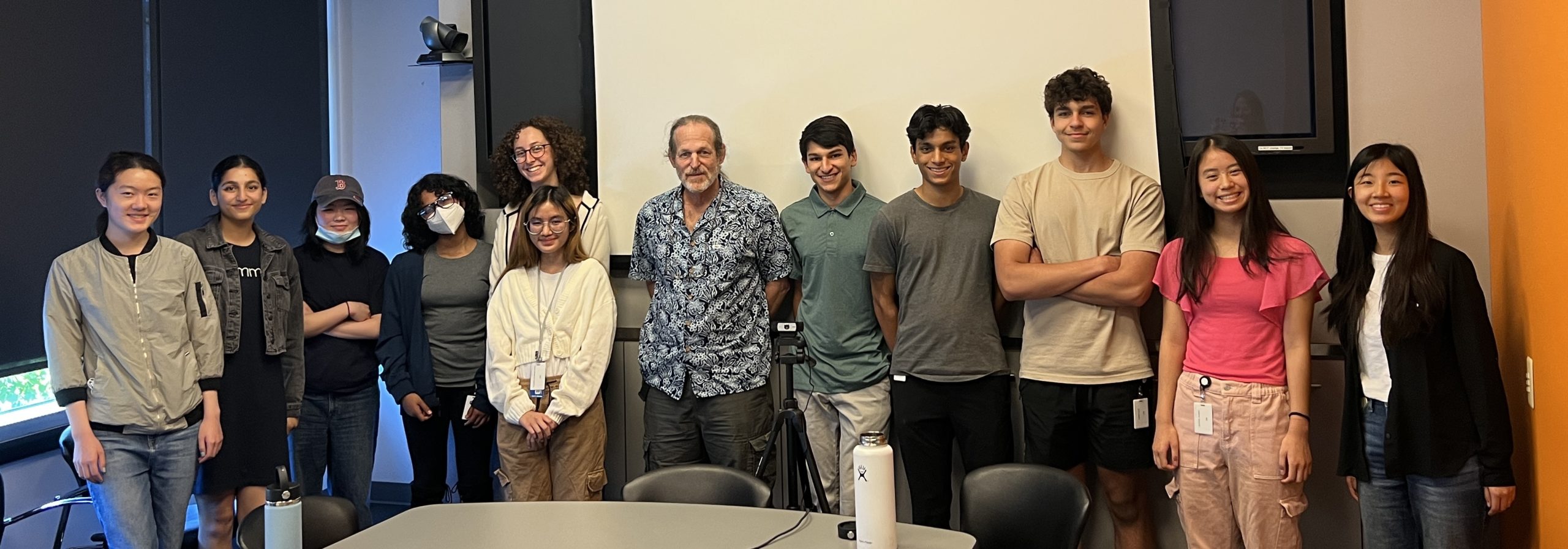
ISB President Dr. Jim Heath is pictured with interns this summer.
Interns learned and contributed to research projects led by 23 ISB researchers in 10 of ISB’s labs. The Education team is analyzing the data about the impact of these efforts, which includes quantitative progress students make toward STEM success and qualitative measures such as these quotes:
“I really loved my project and have learned so much during my time at ISB from lab skills to words of wisdom from mentors and interviews. Could not have had a better high school internship experience!”
“It was great. Truly. I am so grateful for this program and to the people I meet on the way. I can’t tell you how much more confidence it gave me going forward.”
ISB Education provided STEM learning experiences for 130 other high school students through virtual Environmental Systems in the Outdoors Research Experience, a leadership program, two courses at Washington Network for Innovative Careers, and our Systems Thinkers in STEM Ambassadorship.
Here’s what students had to say:
“During my time with ISB, I got to work a lot with systems. Besides my project, we identified and created our own systems which really helped me become confident that I could excel in STEM work. By being able to look into my own backyard and point out an actual system made me feel like a real scientist.”
“This was really eye-opening! I used to think leadership wasn’t for me, and would shy away from any leadership-related things, but this program changed my mind.”
“Initially I wasn’t sure whether to take the opportunity of this experience since I also had a lot of other activities going on at the time and wasn’t sure if it was worth my time. But I pushed myself to do so because I’ve been wanting to improve my leadership and communication skills. I found that decision to be a good one. I’ve learned lots from this program, challenged my own ideas, and confirmed some other things that have been said to me by mentors in the past. If there are more experiences like this, I would definitely want to do them.”
The Education team wrote two portraits of ISB Education’s workshops designed to support K-12 teachers, and funded by Washington state.
You can see all of the project portraits here.
RELATED: Click here to read the ISB Education highlights from the 2021-22 school year



